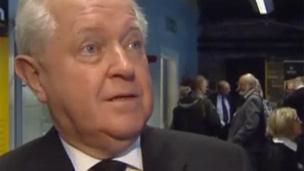University of Wales effectively abolished in merger
- Published
The troubled University of Wales (UoW) has been effectively abolished and its council chairman has resigned.
The UoW has been criticised over BBC Wales revelations of a visa scam at a partner college in London.
Hugh Thomas, who has been under pressure to quit, said he was stepping down in the "best interests of the transformed university".
The UoW will be rebranded in a merger and future students will receive Trinity St David college degrees.
The merger involves Trinity St David and Swansea Metropolitan colleges.
BBC Wales education correspondent Ciaran Jenkins said it will effectively signal the end of the University of Wales as an institution after 120 years.
The new merged college will operate under the royal charter of Trinity Saint David, which dates back nearly 190 years.
The university has said the development signifies "a sense of history and a new beginning".
The future of the University of Wales had come into question following Welsh government proposals to rationalise the structure of higher education in Wales.
It was compounded by scandals involving courses validated by the University of Wales at outside bodies at in the UK and overseas.
Education minister Leighton Andrews told BBC Wales earlier this month that Mr Thomas should resign, with the university's leadership "untenable".
He said what had happened over the last year was "deplorable" and he thought the University of Wales "probably requires a decent burial."
Mr Andrews had warned of the damage to others in the university sector, while several colleges in Wales which awarded University of Wales degrees announced plans to award their own degrees as the revelations continued to unravel.
Rayat London College has been suspended by the UK Border Agency and prevented from recruiting overseas students following a visa scam.
Last year BBC Wales revealed Fazley Yaakob, a pop star with two bogus degrees, was running a college offering UoW courses in Malaysia.
It led to a damning report from the higher education watchdog, the QAA, which found serious shortcomings in the way the university collaborates with colleges around the world.

Education Minister Leighton Andrews had called for Hugh Thomas (pictured) to resign earlier this month
Vice-chancellor Prof Medwin Hughes said the university had committed itself to an "irreversible change which will deliver for our nation. It signifies a sense of history but also a commitment to a new beginning."
He told BBC Wales it was an "historic day" and that the three institutions were recreating themselves under the new degree-awarding "brand" of University of Wales: Trinity St David.
Mr Thomas, announcing his resignation, said the "historic decision" taken by the governing body for merger had led him to assess what in leadership terms was in the best interests of the transformed university.
Vice chairman Alun Thomas said Mr Thomas was a man of "integrity and commitment".
"We understand Hugh's reasons for standing down at this time and we thank him unreservedly for leading the university to a position where the inheritance of its founders can be secured."
A Welsh government spokesperson said: "We welcome the decision of the chairman to resign. It is the right decision in light of recent events.
'Distinguished history'
"The University of Wales has played an important part in the history of Wales. It's important that any successor institution builds upon that history."
Conservative education spokeswoman Angela Burns AM said: "It is now crucial that lessons are learned and that Welsh Higher Education regains its credibility".
Dr Peter Noyes, vice chancellor of the University of Wales, Newport, said Friday's announcement "should not detract from a distinguished history lasting 12 decades".
"Wales should be sad that this day has come but those who have played a part in the institution's history, whether graduates, academics or others should look back with fondness on this national institution," he said.
"We are heading towards a future with a transformed higher education sector in Wales and it had become clear that the University of Wales was unable to play a part in that future."
- Published19 October 2011
- Published19 October 2011
- Published12 October 2011
- Published12 October 2011
- Published7 October 2011
- Published6 October 2011
- Published6 October 2011
- Published5 October 2011